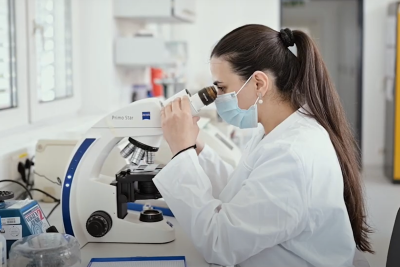News
The LOEWE Center FCI discovers a resistance mechanism in the treatment of rectal carcinoma, in which inflammatory connective tissue cells reduce the response to radiochemotherapy
As part of the LOEWE Center Frankfurt Cancer Institute (FCI), the group of Prof. Florian Greten, based at the Georg-Speyer-Haus and in cooperation with Prof. Claus Rödel and Prof. Emmanouil Fokas from the Department of Radiotherapy and Oncology, has identified a new resistance mechanism for the therapy of rectal carcinomas: Based on patient samples from the University Hospital Frankfurt, it could be shown in the laboratory and in preclinical models that it is not primarily the tumor cells themselves, but surprisingly the surrounding inflammatory connective tissue cells that have a significant influence on the response to radiotherapy. With the inhibition of an inflammatory messenger substance, the cancer can be attacked again by radiation. This can become another treatment option for patients with otherwise resistant tumors, as well. The study has now been published in the renowned journal Cancer Cell.
Great improvements have been made in the multimodal treatment of rectal cancer in recent years; The German rectal cancer study group headed by Prof. Rödel and Prof. Fokas is currently testing an organ-preserving procedure without surgical removal of the tumor for patients who have responded completely to radiochemotherapy. In the course of these investigations, however, there are always patients who do not respond or respond only insufficiently to standard radiochemotherapy. In order to better understand the reasons for this different tumor response, doctors from the Department of Radiotherapy and Oncology, the University Center for Tumor Diseases (UCT) and other parts of the University Hospital Frankfurt am Main at the Frankfurt Cancer Institute (LOEWE-FCI) as well as Scientists from the Georg-Speyer-Haus have joined forces. Now they have got a significant step further on this question: By examining not only the tumor itself in all details, but also the tissue and the various cell types that surround the tumor - the tumor microenvironment - the researchers of the interdisciplinary team found out that special connective tissue cells of the microenvironment in the therapy-resistant tumors are in an inflammatory stage. Radiation therapy causes these cells to undergo further changes that ultimately lead to tumor cells becoming more resistant to radiation. If the inflammatory messenger called IL-1a was inhibited, these changes could be stopped and the cancer became vulnerable again through radiation. Minister of State Angela Dorn is pleased with the news and congratulates the LOEWE Center FCI on this success: "With our LOEWE program, we as the state of Hesse want to support precisely such cutting-edge research. If the effects of cancer therapies can be better predicted and thus controlled in a more targeted manner, this can help many suffering people," explains Angela Dorn. Prof. Greten, Director of the Georg-Speyer-Haus and spokesman for the LOEWE Center, is also very proud of the research results: "The FCI as a translational network has impressively demonstrated how the research cycle can produce solutions to relevant problems from practice when the various disciplines work closely together: In our interdisciplinary clinical translation program on rectal cancer, we took up a clinical challenge, analyzed the molecular mechanism, and now we are bringing the results back to the patients.”
Original publication Nicolas et. al., Inflammatory fibroblasts mediate resistance to neoadjuvant therapy in rectal cancer, Cancer Cell (2022)



